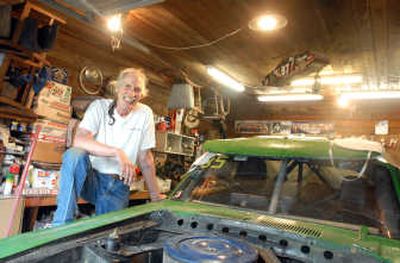Stock racer waves green flag for biofuels

Bob Flagor hopes his race car will help save the whales, put an end to torture, boost locally grown vegetables and showcase the powers of biofuel.
But when the Coeur d’Alene environmental scientist stomps the accelerator of his 1968 Mustang Fastback, he thinks only about driving the fastest 30 laps of his life.
“I’ve got to be the biggest hypocrite around,” Flagor said, laughing. “I’m a professional conservationist. I do everything you’re supposed to do. I recycle. Then I go and drive a car that gets 3 mpg and needs new tires every 100 miles.”
With each race Flagor not only tries to win, the self-described “hippie” also wants to promote social or environmental consciousness. He advertises these causes on his vehicle – the Sierra Club decal shares a spot just above a tribute sticker to the late, great racer Dale Earnhardt. This year, Flagor also started burning crop-based ethanol in his motor.
Inspired by NASCAR driver and 2002 Daytona 500 winner Ward Burton, Flagor donates proceeds from wins to nonprofit groups. Burton set up a foundation and uses his winnings to promote wildlife conservation.
Flagor has previously donated winnings to Greenpeace and the American Civil Liberties Union. Tonight he’s racing at Stateline Speedway for the Kootenai Environmental Alliance. The top prize is $65, which might just cover Flagor’s overdue membership fees to the Coeur d’Alene-based group.
“I’d probably be a member in good standing again,” Flagor said.
The Kootenai Environmental Alliance often looks to its members for creative fundraising help, but the group had never considered stock-car racing, said Barry Rosenberg, executive director.
“This is a first,” he said. “It’s something light for a change.”
Rosenberg loves the idea and plans to be at the track tonight – with his earplugs ready.
“We all do things that aren’t environmentally benign. We’re human beings,” Rosenberg said. “He’s running 85 percent ethanol, though.”
When Flagor is not racing, or working under his car’s hood, or tending his large patch of organic garlic, he serves as the administrator of the Kootenai-Shoshone Soil and Water Conservation District. He started racing stock cars five years ago. His children were grown, and he said it was time “to fulfill a childhood fantasy.”
For the past five years, Flagor has been racing most weekends between April and October in the hobby sport class at Stateline Speedway. This season, he’s ninth in a field of 15 drivers.
“Some of these guys have really fast cars,” Flagor explained. “They invest a lot of time and money in it, and they want to win a championship. All I want to do is burn a whole bunch of adrenaline, have a good time and prove that ethanol works.”
Ethanol is one of Flagor’s causes. He works with farmers and was once a tractor mechanic. Finding a way to turn straw and wood chips into fuel might help keep local farmers and foresters in business, as well as bring energy independence to the United States, he said.
Before the race season began, Flagor spent about $300 tweaking the carburetor and installing a bigger fuel pump so his Mustang could handle ethanol. When he showed up at the track with his biofuel-powered vehicle, some of the other racers snickered.
“There’s a certain amount of amusement from the other drivers with the local hippie at the racetrack,” he said. “Once I started passing them in the turns, the tune changed a little.”
Although most local drivers might still burn fossil fuel, some professionals have also made the switch to ethanol. Last year, the Indianapolis 500 was powered entirely by ethanol.
“When you stomp on the gas, it responds,” Flagor said of his fuel choice. “It shows people that if it’s good enough for race cars, it’s good enough for street cars.”
Flagor hopes he can bring a slight tinge of green to the traditionally redneck realm of stock-car racing – and perhaps remind people that not all hippies drive microbuses or hybrid vehicles. Mostly, though, Flagor just wants to be the first to cross the finish line.
“I just want to beat the pants off ‘em,” he said. “When that green flag falls, my heart just pounds out of my chest. Words can’t really describe the adrenaline rush of standing on the gas, going as fast as you can and being three wide into a turn knowing somebody is going to crash.”